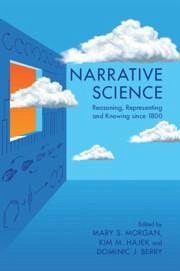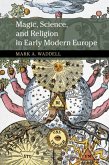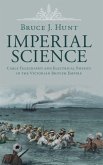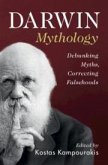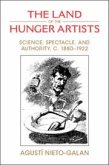Narrative Science
Reasoning, Representing and Knowing Since 1800
Herausgeber: Morgan, Mary S; Berry, Dominic J; Hajek, Kim M
Versandkostenfrei innerhalb Deutschlands
38,99 €
inkl. MwSt.
Versandkostenfrei*
Liefertermin unbestimmt
Melden Sie sich
hier
hier
für den Produktalarm an, um über die Verfügbarkeit des Produkts informiert zu werden.

19 °P sammeln
Narrative Science
Reasoning, Representing and Knowing Since 1800
Herausgeber: Morgan, Mary S; Berry, Dominic J; Hajek, Kim M
- Broschiertes Buch
This collection is the outcome of a major European Research Council funded investigation into the role of narrative in science over the past two centuries. Drawing together a wide range of thought-provoking case studies, this landmark study revises our understanding of what science is and reveals the importance of narrative in how it works.
Andere Kunden interessierten sich auch für
![Magic, Science, and Religion in Early Modern Europe Magic, Science, and Religion in Early Modern Europe]() Mark A. Waddell (Michigan State University)Magic, Science, and Religion in Early Modern Europe32,99 €
Mark A. Waddell (Michigan State University)Magic, Science, and Religion in Early Modern Europe32,99 €![Imperial Science Imperial Science]() Bruce J. Hunt (Austin University of Texas)Imperial Science102,99 €
Bruce J. Hunt (Austin University of Texas)Imperial Science102,99 €![Darwin Mythology Darwin Mythology]() Darwin Mythology38,99 €
Darwin Mythology38,99 €![The Land of the Hunger Artists The Land of the Hunger Artists]() Agusti Nieto-Galan (Universitat Autonoma de Barcelona)The Land of the Hunger Artists30,99 €
Agusti Nieto-Galan (Universitat Autonoma de Barcelona)The Land of the Hunger Artists30,99 €![The Cambridge Companion to John Herschel The Cambridge Companion to John Herschel]() The Cambridge Companion to John Herschel33,99 €
The Cambridge Companion to John Herschel33,99 €![The Origins of Modern Science The Origins of Modern Science]() Ofer Gal (University of Sydney)The Origins of Modern Science42,99 €
Ofer Gal (University of Sydney)The Origins of Modern Science42,99 €![The Victorian Palace of Science The Victorian Palace of Science]() Edward J. Gillin (University of Cambridge)The Victorian Palace of Science114,99 €
Edward J. Gillin (University of Cambridge)The Victorian Palace of Science114,99 €-
-
-
This collection is the outcome of a major European Research Council funded investigation into the role of narrative in science over the past two centuries. Drawing together a wide range of thought-provoking case studies, this landmark study revises our understanding of what science is and reveals the importance of narrative in how it works.
Hinweis: Dieser Artikel kann nur an eine deutsche Lieferadresse ausgeliefert werden.
Hinweis: Dieser Artikel kann nur an eine deutsche Lieferadresse ausgeliefert werden.
Produktdetails
- Produktdetails
- Verlag: Cambridge University Press
- Seitenzahl: 498
- Erscheinungstermin: 15. Dezember 2022
- Englisch
- Abmessung: 227mm x 148mm x 28mm
- Gewicht: 736g
- ISBN-13: 9781009001991
- ISBN-10: 100900199X
- Artikelnr.: 63508634
- Herstellerkennzeichnung
- Libri GmbH
- Europaallee 1
- 36244 Bad Hersfeld
- gpsr@libri.de
- Verlag: Cambridge University Press
- Seitenzahl: 498
- Erscheinungstermin: 15. Dezember 2022
- Englisch
- Abmessung: 227mm x 148mm x 28mm
- Gewicht: 736g
- ISBN-13: 9781009001991
- ISBN-10: 100900199X
- Artikelnr.: 63508634
- Herstellerkennzeichnung
- Libri GmbH
- Europaallee 1
- 36244 Bad Hersfeld
- gpsr@libri.de
List of figures; Authors and affiliations; Foreword Mary S. Morgan, Kim M.
Hajek and Dominic J. Berry; Prologues; 1. Narrative: A general purpose
technology for science Mary S. Morgan; 2. What is narrative in narrative
science? The narrative science approach Kim M. Hajek; Part I. Matters of
Time: When time matters in the sciences, it matters in their narratives,
but those narratives rarely use a simple account of time; 3. Mass
extinctions and narratives of recurrence John E. Huss; 4. The narrative
nature of geology and the rewriting of the stac fada story Andrew Hopkins;
5. Reasoning from narratives and models: reconstructing the tohoku
earthquake Teru Miyake; 6. Stored and storied time in archaeology Anne
Teather; Part II. Accessing Nature's Narratives: When nature is seen as
narrating itself, narrative becomes a constituent feature of scientific
accounts; 7. Great exaptations: On reading Darwin's plant narratives Devin
Griffiths; 8. From memories to forecasting: Narrating imperial storm
science Debjani Bhattacharyya; 9. Visual evidence and narrative in botany
and war: Two domains, one practice Elizabeth Haines; 10. The trees' tale:
Filigreed phylogenetic trees and integrated narratives Nina Kranke; 11.
Process tracing and narrative science Sharon Crasnow; Part III. Research
Narratives: When scientists write about their research, their narratives
centre on their practices but reveal their beliefs about phenomena; 12.
Research articles as narratives: Familiarizing communities with an approach
Robert Meunier; 13. Thick and thin chemical narratives Mat Paskins; 14.
Reporting on plagues: Epidemiological reasoning in the early twentieth
century Lukas Engelmann; 15. The politics of representation: Narratives of
automation in twentieth century American mathematics Stephanie Dick; 16.
Chronicle, genealogy, and narrative: Understanding synthetic biology in the
image of historiography Berry; Part IV. Narrative Sensibility and Argument:
When narrative acts as a site for reasoning; 17. Anecdotes: epistemic
switching in medical narratives Brian Hurwitz; 18. Narrative performance
and the 'taboo on causal inference': A case study of conceptual remodelling
and implicit causation Elspeth Jajdelska; 19. Reading mathematical proofs
as narratives Line Edlsev Andersen; 20. Narrative solutions to a common
evolutionary problem John Beatty; 21. Just-so what? Paula Olmos; 22.
Narrative and natural language M. Norton Wise; Index.
Hajek and Dominic J. Berry; Prologues; 1. Narrative: A general purpose
technology for science Mary S. Morgan; 2. What is narrative in narrative
science? The narrative science approach Kim M. Hajek; Part I. Matters of
Time: When time matters in the sciences, it matters in their narratives,
but those narratives rarely use a simple account of time; 3. Mass
extinctions and narratives of recurrence John E. Huss; 4. The narrative
nature of geology and the rewriting of the stac fada story Andrew Hopkins;
5. Reasoning from narratives and models: reconstructing the tohoku
earthquake Teru Miyake; 6. Stored and storied time in archaeology Anne
Teather; Part II. Accessing Nature's Narratives: When nature is seen as
narrating itself, narrative becomes a constituent feature of scientific
accounts; 7. Great exaptations: On reading Darwin's plant narratives Devin
Griffiths; 8. From memories to forecasting: Narrating imperial storm
science Debjani Bhattacharyya; 9. Visual evidence and narrative in botany
and war: Two domains, one practice Elizabeth Haines; 10. The trees' tale:
Filigreed phylogenetic trees and integrated narratives Nina Kranke; 11.
Process tracing and narrative science Sharon Crasnow; Part III. Research
Narratives: When scientists write about their research, their narratives
centre on their practices but reveal their beliefs about phenomena; 12.
Research articles as narratives: Familiarizing communities with an approach
Robert Meunier; 13. Thick and thin chemical narratives Mat Paskins; 14.
Reporting on plagues: Epidemiological reasoning in the early twentieth
century Lukas Engelmann; 15. The politics of representation: Narratives of
automation in twentieth century American mathematics Stephanie Dick; 16.
Chronicle, genealogy, and narrative: Understanding synthetic biology in the
image of historiography Berry; Part IV. Narrative Sensibility and Argument:
When narrative acts as a site for reasoning; 17. Anecdotes: epistemic
switching in medical narratives Brian Hurwitz; 18. Narrative performance
and the 'taboo on causal inference': A case study of conceptual remodelling
and implicit causation Elspeth Jajdelska; 19. Reading mathematical proofs
as narratives Line Edlsev Andersen; 20. Narrative solutions to a common
evolutionary problem John Beatty; 21. Just-so what? Paula Olmos; 22.
Narrative and natural language M. Norton Wise; Index.
List of figures; Authors and affiliations; Foreword Mary S. Morgan, Kim M.
Hajek and Dominic J. Berry; Prologues; 1. Narrative: A general purpose
technology for science Mary S. Morgan; 2. What is narrative in narrative
science? The narrative science approach Kim M. Hajek; Part I. Matters of
Time: When time matters in the sciences, it matters in their narratives,
but those narratives rarely use a simple account of time; 3. Mass
extinctions and narratives of recurrence John E. Huss; 4. The narrative
nature of geology and the rewriting of the stac fada story Andrew Hopkins;
5. Reasoning from narratives and models: reconstructing the tohoku
earthquake Teru Miyake; 6. Stored and storied time in archaeology Anne
Teather; Part II. Accessing Nature's Narratives: When nature is seen as
narrating itself, narrative becomes a constituent feature of scientific
accounts; 7. Great exaptations: On reading Darwin's plant narratives Devin
Griffiths; 8. From memories to forecasting: Narrating imperial storm
science Debjani Bhattacharyya; 9. Visual evidence and narrative in botany
and war: Two domains, one practice Elizabeth Haines; 10. The trees' tale:
Filigreed phylogenetic trees and integrated narratives Nina Kranke; 11.
Process tracing and narrative science Sharon Crasnow; Part III. Research
Narratives: When scientists write about their research, their narratives
centre on their practices but reveal their beliefs about phenomena; 12.
Research articles as narratives: Familiarizing communities with an approach
Robert Meunier; 13. Thick and thin chemical narratives Mat Paskins; 14.
Reporting on plagues: Epidemiological reasoning in the early twentieth
century Lukas Engelmann; 15. The politics of representation: Narratives of
automation in twentieth century American mathematics Stephanie Dick; 16.
Chronicle, genealogy, and narrative: Understanding synthetic biology in the
image of historiography Berry; Part IV. Narrative Sensibility and Argument:
When narrative acts as a site for reasoning; 17. Anecdotes: epistemic
switching in medical narratives Brian Hurwitz; 18. Narrative performance
and the 'taboo on causal inference': A case study of conceptual remodelling
and implicit causation Elspeth Jajdelska; 19. Reading mathematical proofs
as narratives Line Edlsev Andersen; 20. Narrative solutions to a common
evolutionary problem John Beatty; 21. Just-so what? Paula Olmos; 22.
Narrative and natural language M. Norton Wise; Index.
Hajek and Dominic J. Berry; Prologues; 1. Narrative: A general purpose
technology for science Mary S. Morgan; 2. What is narrative in narrative
science? The narrative science approach Kim M. Hajek; Part I. Matters of
Time: When time matters in the sciences, it matters in their narratives,
but those narratives rarely use a simple account of time; 3. Mass
extinctions and narratives of recurrence John E. Huss; 4. The narrative
nature of geology and the rewriting of the stac fada story Andrew Hopkins;
5. Reasoning from narratives and models: reconstructing the tohoku
earthquake Teru Miyake; 6. Stored and storied time in archaeology Anne
Teather; Part II. Accessing Nature's Narratives: When nature is seen as
narrating itself, narrative becomes a constituent feature of scientific
accounts; 7. Great exaptations: On reading Darwin's plant narratives Devin
Griffiths; 8. From memories to forecasting: Narrating imperial storm
science Debjani Bhattacharyya; 9. Visual evidence and narrative in botany
and war: Two domains, one practice Elizabeth Haines; 10. The trees' tale:
Filigreed phylogenetic trees and integrated narratives Nina Kranke; 11.
Process tracing and narrative science Sharon Crasnow; Part III. Research
Narratives: When scientists write about their research, their narratives
centre on their practices but reveal their beliefs about phenomena; 12.
Research articles as narratives: Familiarizing communities with an approach
Robert Meunier; 13. Thick and thin chemical narratives Mat Paskins; 14.
Reporting on plagues: Epidemiological reasoning in the early twentieth
century Lukas Engelmann; 15. The politics of representation: Narratives of
automation in twentieth century American mathematics Stephanie Dick; 16.
Chronicle, genealogy, and narrative: Understanding synthetic biology in the
image of historiography Berry; Part IV. Narrative Sensibility and Argument:
When narrative acts as a site for reasoning; 17. Anecdotes: epistemic
switching in medical narratives Brian Hurwitz; 18. Narrative performance
and the 'taboo on causal inference': A case study of conceptual remodelling
and implicit causation Elspeth Jajdelska; 19. Reading mathematical proofs
as narratives Line Edlsev Andersen; 20. Narrative solutions to a common
evolutionary problem John Beatty; 21. Just-so what? Paula Olmos; 22.
Narrative and natural language M. Norton Wise; Index.
